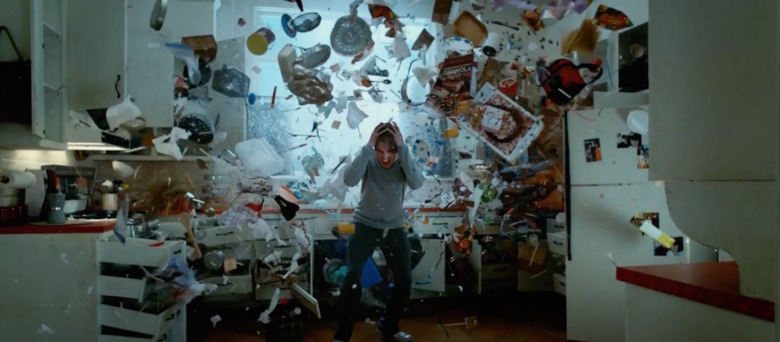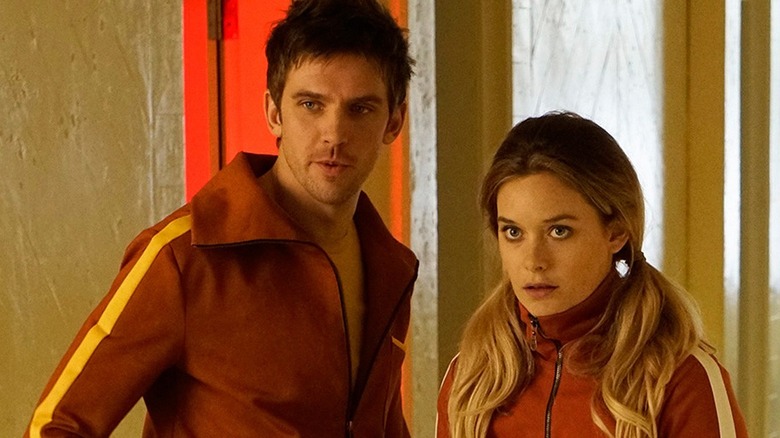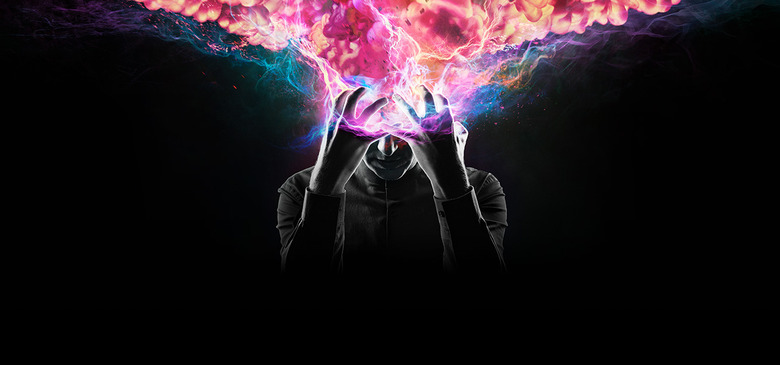'Legion' Spoiler Review: Thoughts On "Chapter 1"
Let's get the high praise out of the way first: it's rare for a television pilot to feel as fresh and weird and fully formed as Legion, which feels more like the first 70 minutes of a particularly daring X-Men movie than the first chapter of an ongoing series airing on FX. There is a distinctive personality on display here, a carefully modulated tone that folds horror and dark comedy and mindfuckery into the typical superhero structure. It doesn't shatter the mold, but it leaves a giant crack in it – I literally have no idea what to expect from the next episode and man-oh-man, is that a nice feeling.
And it looks like we'll be covering Legion on a weekly basis from here on out, with all other spoiler reviews arriving the morning after the new episode airs. Hi. Like the show itself, these reviews aren't going to follow a rigid structure. We're just going to pick up the threads of interest and run with them until we can figure out exactly what kind of show we're dealing with here.
Who Is David Haller?
Of all the potential X-Men comic book characters to get their own television show, David "Legion" Haller can't help but feel like an off-kilter choice. Your average television watcher (and your average viewer of comic book movies and shows) probably isn't familiar with him and that's a double-edged sword. On one hand, you have to introduce him to the masses and explain why they need to care about his problems. On the other hand, the lack of the public's familiarity with him gives creator and showrunner Noah Hawley a flexibility you won't find in many big screen superhero outings, where the template is tested and expected and in the case of the recent core X-Men movies, painfully boring.
The pilot for Legion leaves certain aspects of David a deliberate question mark. For those average TV viewers, that's the mystery at hand: what are his powers, how do they manifest, and when will he learn how to control them? For comic book fans, there's a different question at hand: how will the show adapt, and will they tone down, one of the weirder characters in Marvel comics? Because the live-action version of David looks nothing like his comic book counterpart, with his very silly, very tall flat-top haircut, the only immediate connection between the two versions is how his superpowers manifest from mental illness. The exact nature of the connection between the voices in his head and the incredible powers he cannot control remains unexplored when the credits roll on "Chapter 1" and for that reason, we're going to hold off on diagnosing his mutant skill set – that may prove to be too much of a spoiler, even for a so-called "spoiler review."
Besides, Jean Smart is here and she's surely going to start explaining things in the next episode. Surely.
A Cast of "Crazies"
It was inevitable that Dan Stevens was eventually going to get around to playing a superhero – it's what all the up-and-coming actors are doing these days. And thankfully, Legion gives Stevens plenty to chew on, letting him do dramatic and funny and just a little bit of badass. That little bit is very important here, as David Haller is no superhero. He's falling apart. He's a mess. We first meet his grown-up self in an institution where he lives under constant observation and can't even accept a cupcake from his visiting sister. To Stevens' credit (and to the show's), David's illness isn't portrayed as sexy or cool or even mysterious, as is often the trend with shows built around "crazy" characters. His life is all about navigating uncontrollable emotions and overcoming obstacles that make basic socialization difficult. Stevens is a good looking guy, but this may be one of the least sexy characters to ever sit center stage in a comic book property. And he owns it.
Stevens' performance is the highlight here, but "Chapter 1" does surround him with a promising supporting cast. Rachel Keller's Sydney "Syd" Barrett (whose name is a cheeky Pink Floyd reference) leaves a strong impression as a potential love interest. Katie Aselton's Amy Haller gives us a "normal" person to act as an audience surrogate (and her quickly removing every sharp implement from David's basement room after his latest telekinetic outburst is a much-needed laugh at that point in the episode). Most promising is Aubrey Plaza's Lenny Busker, who meets a violent end about halfway through "Chapter 1" but lives on as some kind of psychic echo within David's mind. Plaza's natural deadpan is perfect for this material and the thought of her serving as a Greek chorus to a troubled mutant is an enticing thought.
Mental Illness as a Mental Power
The X-Men stories have been, since their inception, a metaphor for civil rights and like many metaphors, they have been occasionally been strained and sloppy and inconsistent. Still, few ongoing superhero stories have their heart in the right place quite like the ongoing trials and tribulations of the mutant population, who fight for the right to simply live in a world that hates them (and have made a habit of saving those who hate them from world-ending cataclysms on a regular basis). Under director Bryan Singer's watch, the main X-Men movies became a stand-in for the modern struggle of LGBTQ men and women.
But Legion seems to be taking a different approach, an approach that is defined entirely by David Haller and his mental illness. Like so many other mutants across the X-Men corner of the Marvel universe, the source of David's strength also makes his life a living hell. His powers tear his life apart even as they allow him to transcend typical human norms. His schizophrenia plagues him, demolishing relationships even as it somehow feeds into his ability to control objects with mind.
And if you'll allow me to break out the dreaded first-person for a paragraph, this is an approach that hits home for me and may hit home for many others who have struggled with mental illness. I spend each and every day doing battle with clinical depression and anxiety, but I'd be lying to myself if I said that these parts of me don't help define who I am as a human being. Would I be a writer if I didn't spend so much of my time stuck inside my own head? Would I have the same pop culture obsessions if I wasn't so very concerned about things that don't matter in day-to-day life? Probably not.
Going forward, Legion has a major responsibility: to depict mental illness as a daily struggle but also as a defining part of David Haller and a key source of what makes him unique. That contradiction, so clearly present in the real world, is ripe for exploration in a show where people can switch bodies upon contact and fling boulders with their minds.
This Is a Horror Story
There's a lot to admire in "Chapter 1," but the most surprising and compelling element is that it's just plain frightening, leaning on horror imagery to sell its stakes and mystery. This is best summed up by the mysterious yellow-eyed creature that haunts David's psyche, a masterstroke of creature design that is so unpleasant that I have a hard time even looking at it. It's unsettling when it appears as part of grander hallucinations. It's even more unsettling when it casually appears in frame, skipping the grand entrance in favor of reminding us that it's always watching.
The horror also helps sell the show's visual quirks and comedy, with the stylistic touches, classic rock needle drops, and goofy jokes feeling like a thematically appropriate blast of gallows humor. Isn't that how you get through a bad situation? Isn't that how you endure a nightmare? With a certain self-awareness that your horrible situation is actually pretty amusing when viewed from the right distance?
The horror sets the stage for that grand finale, when David is rescued by a mysterious team of mutants and learns that everything is real. But that creature is still watching (truth to certain delusions does not equal a free pass from mental illness) and our hero is still going to deal with the daily dread of his existence, even when he's amongst those who understand exactly what he's going through.
A Most Ambitious Structure
It makes perfect sense that Noah Hawley, the man who somehow made a series based on Fargo into the one of the best things you watch on television, would see an X-Men show as an opportunity to play with storytelling structure. Beginning with that eerie opening montage, where the increasingly unstable life of David Haller is recapped through a series of images where every cut sees him age a few years, Hawley (who wrote and directed the episode) reveals an ambition to play fast and loose with time and space. After all, we're dealing with characters who can manipulate the world around them in strange and amazing and often horrifying ways. What better way to showcase the confusion of being a troubled person with superpowers than to allow the very show they exist within to reflect their daily confusion and terror and general sense of everything just not being okay?
When it comes to narrative complexity, Legion is no Westworld. Its timeline mysteries are resolved by the final act. However, the show's willingness to introduce competing timelines, to leap back and forth in time with single cuts and demanding that we keep up, is initially baffling but ultimately sublime. This is a show were key exposition drops occur when a character invades David's memories to offer an escape plan moments before the flashback we're watching reveals how he was captured in the first place. That's wild stuff and I can only hope that future episodes will maintain this sense of daring playfulness.
But Is This a Proper X-Men TV Show?
Despite the references to mutants (and to incidents they have caused elsewhere in the world), Legion contains no direct references to the X-Men films and Hawley has indicated in the press that it will stay that way. For better or worse, Legion exists in its own little pocket – you can imagine that Hugh Jackman's Wolverine is off doing what he does best somewhere else, but the story is very much concerned with doing its own thing and focusing on its own characters.
And that's perfectly okay. It's great, even. While audiences have embraced the interconnectedness of the Marvel Cinematic Universe and how Marvel Studios' movies all take place in the same world as shows like Daredevil and Agents of S.H.I.E.L.D., Legion is so focused on its own specific ideas that to fill it with winks and nudges would dilute would makes it so compelling upon first impression. While it's certainly "comic book-y" for movies and shows to interconnect, it's just as much in the spirit of the source material for Legion to live in an isolated corner and do its own thing. For every major crossover event, you have a dozen individual, ongoing stories following characters who are dealing with their own business. For one relevant example, look to X-Men Legacy, which recently featured a brilliant run by writer Simon Spurrier and artist Tan Eng Huat that followed David Haller as he struggled to control his mental illness while, you know, saving the world. Alone. Without any help from other characters.
It remains to be seen if Legion will allow its version of David Haller to save the world or if the scope will remain focused purely on its characters and their issues. But it's clear that this series is part of the latest X-Men trend: as the Marvel Studios movies and shows grow increasingly intertwined, the X-Men universe is growing more deliberately and gloriously fractured. The silly, low comedy of Deadpool, the hard-edged melancholy of Logan, and the quirky, horror-tinged Legion all represent the X-Men finally coming into their own on the screen...all it took was was 17 years and the complete destruction of formula.





